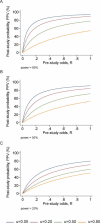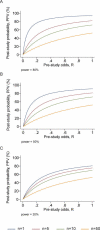Why most published research findings are false
- PMID: 16060722
- PMCID: PMC1182327
- DOI: 10.1371/journal.pmed.0020124
Why most published research findings are false
Erratum in
-
Correction: Why Most Published Research Findings Are False.PLoS Med. 2022 Aug 25;19(8):e1004085. doi: 10.1371/journal.pmed.1004085. eCollection 2022 Aug. PLoS Med. 2022. PMID: 36007233 Free PMC article.
Abstract
There is increasing concern that most current published research findings are false. The probability that a research claim is true may depend on study power and bias, the number of other studies on the same question, and, importantly, the ratio of true to no relationships among the relationships probed in each scientific field. In this framework, a research finding is less likely to be true when the studies conducted in a field are smaller; when effect sizes are smaller; when there is a greater number and lesser preselection of tested relationships; where there is greater flexibility in designs, definitions, outcomes, and analytical modes; when there is greater financial and other interest and prejudice; and when more teams are involved in a scientific field in chase of statistical significance. Simulations show that for most study designs and settings, it is more likely for a research claim to be false than true. Moreover, for many current scientific fields, claimed research findings may often be simply accurate measures of the prevailing bias. In this essay, I discuss the implications of these problems for the conduct and interpretation of research.
Conflict of interest statement
Figures


Comment in
-
Minimizing mistakes and embracing uncertainty.PLoS Med. 2005 Aug;2(8):e272. doi: 10.1371/journal.pmed.0020272. Epub 2005 Aug 30. PLoS Med. 2005. PMID: 16120013 Free PMC article.
-
Truth, probability, and frameworks.PLoS Med. 2005 Nov;2(11):e361. doi: 10.1371/journal.pmed.0020361. Epub 2005 Nov 29. PLoS Med. 2005. PMID: 16288554 Free PMC article. No abstract available.
-
Power, reliability, and heterogeneous results.PLoS Med. 2005 Nov;2(11):e386; author reply e398. doi: 10.1371/journal.pmed.0020386. Epub 2005 Nov 29. PLoS Med. 2005. PMID: 16288559 Free PMC article.
-
The clinical interpretation of research.PLoS Med. 2005 Nov;2(11):e395. doi: 10.1371/journal.pmed.0020395. Epub 2005 Nov 29. PLoS Med. 2005. PMID: 16288562 Free PMC article. No abstract available.
-
Why most published research findings are false: problems in the analysis.PLoS Med. 2007 Apr;4(4):e168. doi: 10.1371/journal.pmed.0040168. PLoS Med. 2007. PMID: 17456002 Free PMC article. No abstract available.
-
When research evidence is misleading.Virtual Mentor. 2013 Jan 1;15(1):29-33. doi: 10.1001/virtualmentor.2013.15.1.jdsc1-1301. Virtual Mentor. 2013. PMID: 23356804 No abstract available.
-
Modeling and research on research.Clin Chem. 2014 Sep;60(9):1238-9. doi: 10.1373/clinchem.2013.218453. Epub 2014 Jul 18. Clin Chem. 2014. PMID: 25037936 No abstract available.
-
The Value of P.Am J Transplant. 2016 Oct;16(10):2769-2770. doi: 10.1111/ajt.14026. Am J Transplant. 2016. PMID: 27662077 No abstract available.
-
Practical Effects of Lowering the P Value in Neurosurgery: Restricting Evidence-Based Medicine to Big Business.World Neurosurg. 2018 Sep;117:460-462. doi: 10.1016/j.wneu.2018.07.112. Epub 2018 Jul 18. World Neurosurg. 2018. PMID: 30031185 No abstract available.
-
Make quotations great again: a proposal to reduce false-knowledge.BMJ Evid Based Med. 2020 Feb;25(1):12-14. doi: 10.1136/bmjebm-2018-111109. Epub 2019 Feb 25. BMJ Evid Based Med. 2020. PMID: 30804021
-
Benign Prostatic Hyperplasia.J Urol. 2023 Dec;210(6):908-910. doi: 10.1097/JU.0000000000003714. Epub 2023 Sep 25. J Urol. 2023. PMID: 37747152 No abstract available.
References
-
- Lawlor DA, Davey Smith G, Kundu D, Bruckdorfer KR, Ebrahim S. Those confounded vitamins: What can we learn from the differences between observational versus randomised trial evidence? Lancet. 2004;363:1724–1727. - PubMed
-
- Vandenbroucke JP. When are observational studies as credible as randomised trials? Lancet. 2004;363:1728–1731. - PubMed
-
- Michiels S, Koscielny S, Hill C. Prediction of cancer outcome with microarrays: A multiple random validation strategy. Lancet. 2005;365:488–492. - PubMed
-
- Ioannidis JPA, Ntzani EE, Trikalinos TA, Contopoulos-Ioannidis DG. Replication validity of genetic association studies. Nat Genet. 2001;29:306–309. - PubMed
MeSH terms
LinkOut - more resources
Full Text Sources
Other Literature Sources

